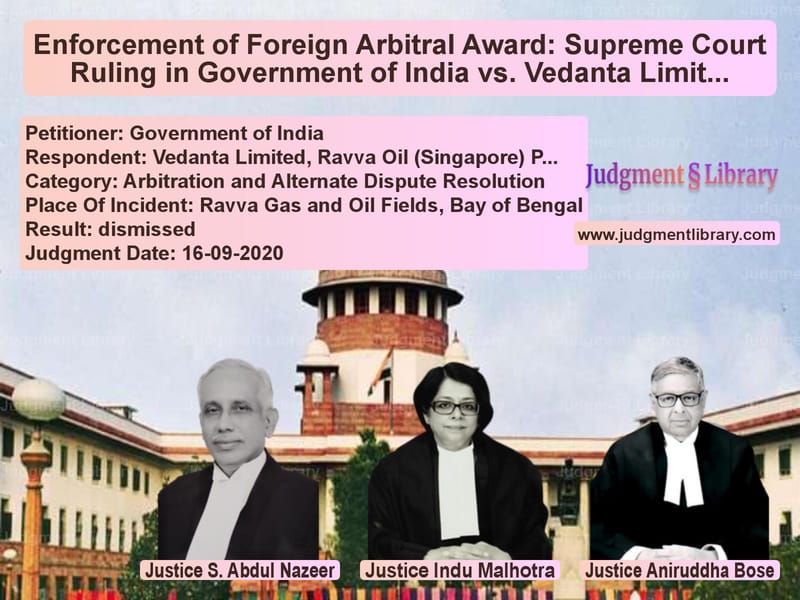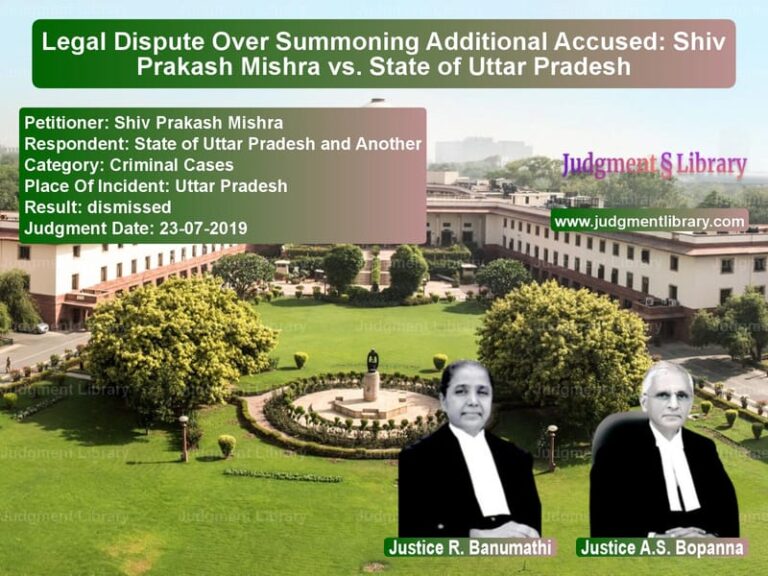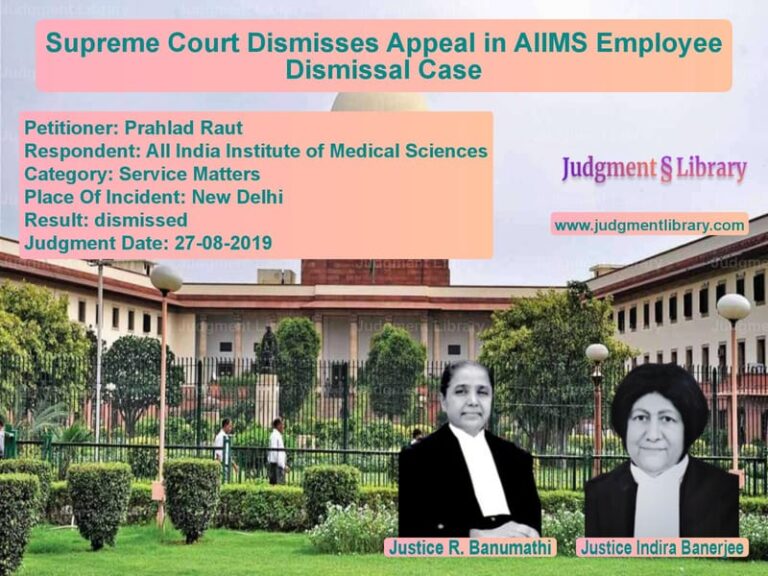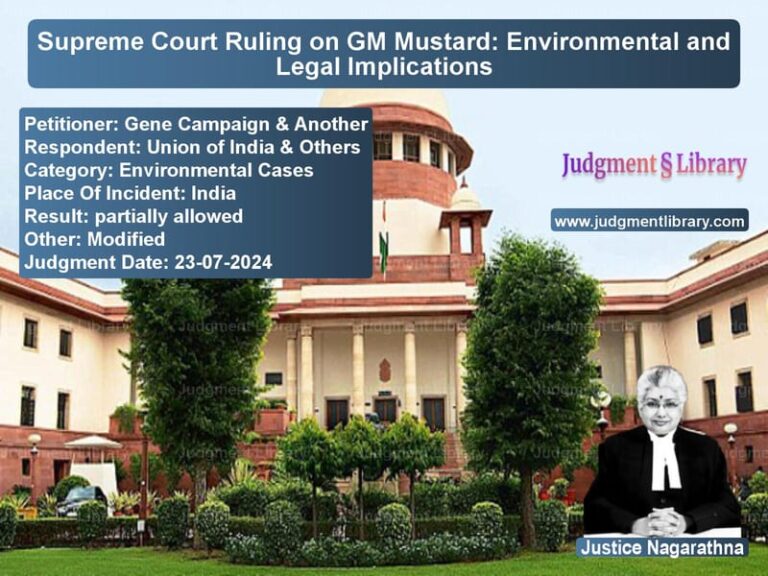Enforcement of Foreign Arbitral Award: Supreme Court Ruling in Government of India vs. Vedanta Limited
The Supreme Court of India, in the case of Government of India vs. Vedanta Limited, delivered a significant judgment on the enforcement of a foreign arbitral award concerning cost recovery disputes in an oil and gas production-sharing contract (PSC). This case examined key legal principles governing the recognition and enforcement of foreign arbitral awards in India, including the applicability of the Arbitration and Conciliation Act, 1996, limitations under Indian law, and the doctrine of public policy.
The ruling affirmed that foreign arbitral awards must be enforced in India unless they fall within the narrow exceptions outlined under Section 48 of the Act. The judgment is a landmark precedent that reinforces India’s pro-arbitration stance while clarifying the legal position on sovereign rights and contractual obligations.
Background of the Case
The dispute arose from a Production Sharing Contract (PSC) signed on October 28, 1994, between the Government of India and various oil and gas companies, including Vedanta Limited (formerly Cairn India Ltd.), Ravva Oil (Singapore) PTE. Ltd., and Videocon Industries Limited. The PSC detailed the cost recovery mechanism for the extraction and production of oil and gas in the Ravva Gas and Oil Fields located in the Bay of Bengal.
The controversy centered on whether certain costs incurred by Vedanta and its partners were recoverable under the PSC. The Government of India argued that the respondents were only entitled to recover costs up to the agreed cap of USD 198,430,000. However, the respondents claimed additional cost recovery of USD 278,871,668 under a contractual provision that allowed recovery in certain exceptional circumstances.
The dispute was referred to arbitration in Kuala Lumpur, Malaysia, which was the designated seat of arbitration under the PSC. The arbitration tribunal ruled in favor of the respondents, allowing the additional cost recovery claim. The Government of India challenged the award in Malaysian courts, but the challenge was dismissed at all levels, including the Malaysian High Court, Court of Appeal, and Federal Court.
Legal Issues and Arguments
The key legal issues before the Supreme Court were:
- Whether the foreign arbitral award was enforceable under Indian law.
- Whether the limitation period under Article 137 of the Limitation Act applied to enforcement proceedings.
- Whether enforcement of the award violated the public policy of India.
- Whether Indian courts could revisit the merits of the dispute.
Arguments by the Government of India
The Government of India raised the following objections to the enforcement of the award:
- The award was contrary to Indian public policy, as it allowed private entities to recover amounts exceeding the agreed cost recovery cap in a contract involving a sovereign function.
- The claim was barred by limitation since the enforcement petition was filed beyond three years from the date of the award.
- The tribunal incorrectly interpreted Article 15.5(c) of the PSC, thereby exceeding its jurisdiction.
- The arbitral award violated fundamental principles of Indian law by allowing claims inconsistent with sovereign control over petroleum resources as per Article 297 of the Indian Constitution.
Arguments by Vedanta Limited and Co-Respondents
Vedanta and its co-respondents countered the government’s objections with the following arguments:
- The enforcement petition was within the limitation period, as the cause of action arose when the government refused to honor the award in 2014.
- The tribunal’s interpretation of the PSC was reasonable, and the Indian courts could not review the merits of the dispute.
- The enforcement of the award did not violate Indian public policy, as commercial disputes cannot be equated with sovereign functions.
- The Government of India participated in the arbitration proceedings and accepted the Kuala Lumpur seat, and thus could not contest enforcement selectively.
Supreme Court’s Analysis and Judgment
On Limitation
The Court ruled that the enforcement of foreign arbitral awards is governed by Article 137 of the Limitation Act, which provides a three-year limitation period. The Court held that this period commences from the date on which the award becomes enforceable, not from the date of the award itself. Since the Government of India refused to comply with the award in 2014, the enforcement petition was filed within time.
On Public Policy
The Court reiterated the principles laid down in Renusagar Power Co. Ltd. v. General Electric Co. and Lal Mahal Ltd. v. Progetto Grano SPA, stating that enforcement can be refused only if it:
- Violates the fundamental policy of Indian law.
- Is against the interests of India.
- Is against justice or morality.
The Court found that none of these conditions were met and emphasized that international commercial arbitration awards must be enforced unless they fall under these limited exceptions.
On Merits of the Award
The Supreme Court emphasized that Indian courts do not have the jurisdiction to reassess the merits of a foreign arbitral award. The Court held that the arbitral tribunal’s interpretation of the PSC was plausible, and since Malaysian courts had upheld the award, there was no ground for Indian courts to interfere.
On Sovereign Rights and Contractual Obligations
The Court rejected the government’s argument that the award infringed on India’s sovereign rights. It held that:
- While petroleum resources belong to the sovereign, commercial contracts involving resource extraction must be honored.
- Cost recovery disputes are commercial matters and do not involve sovereign functions.
- Once the government has entered into a PSC, it must adhere to contractual terms and cannot deny enforcement on vague sovereign immunity grounds.
Conclusion
The Supreme Court dismissed the appeal and upheld the enforcement of the foreign arbitral award, confirming that it did not violate Indian public policy. The Court’s ruling reinforced India’s commitment to international arbitration and contractual enforcement, providing much-needed clarity to foreign investors regarding the enforcement of arbitration awards in India.
The judgment also sets an important precedent for future cases involving the enforcement of foreign arbitral awards in India, reaffirming the judiciary’s pro-arbitration stance while ensuring contractual compliance in disputes involving the government.
Petitioner Name: Government of India.Respondent Name: Vedanta Limited, Ravva Oil (Singapore) PTE. Ltd., Videocon Industries Limited.Judgment By: Justice S. Abdul Nazeer, Justice Indu Malhotra, Justice Aniruddha Bose.Place Of Incident: Ravva Gas and Oil Fields, Bay of Bengal.Judgment Date: 16-09-2020.
Don’t miss out on the full details! Download the complete judgment in PDF format below and gain valuable insights instantly!
Download Judgment: Government of India vs Vedanta Limited, Rav Supreme Court of India Judgment Dated 16-09-2020.pdf
Direct Downlaod Judgment: Direct downlaod this Judgment
See all petitions in Arbitration Awards
See all petitions in Enforcement of Awards
See all petitions in International Arbitration
See all petitions in Commercial Arbitration
See all petitions in Dispute Resolution Mechanisms
See all petitions in Judgment by S. Abdul Nazeer
See all petitions in Judgment by Indu Malhotra
See all petitions in Judgment by Aniruddha Bose
See all petitions in dismissed
See all petitions in supreme court of India judgments September 2020
See all petitions in 2020 judgments
See all posts in Arbitration and Alternate Dispute Resolution Category
See all allowed petitions in Arbitration and Alternate Dispute Resolution Category
See all Dismissed petitions in Arbitration and Alternate Dispute Resolution Category
See all partially allowed petitions in Arbitration and Alternate Dispute Resolution Category







